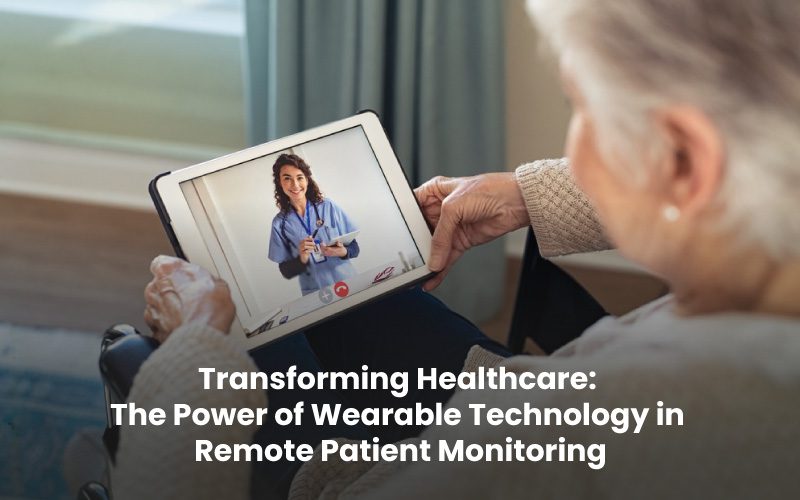Transforming Healthcare: The Power of Wearable Technology in Remote Patient Monitoring

In the dynamic world of healthcare, the relentless pursuit of innovation knows no bounds. Among the groundbreaking advancements that have captured the imaginations of both medical professionals and patients, Far beyond mere accessories, these ingenious devices hold the transformative power to revolutionize patient care and reshape our approach to healthcare.
Embarking on this captivating journey into wearable technology, we uncover an empire of unparalleled potential to empower patients with real-time health insights. These unassuming devices, designed to seamlessly integrate into our daily lives, discreetly monitor vital signs, activity levels, and even sleep patterns, granting individuals invaluable access to critical health data. The power lies in their hands to take charge of their well-being like never before, making informed choices that positively impact their lifestyle, exercise routines, and overall health.
Breaking barriers in healthcare delivery, remote patient monitoring wearables emerge as formidable allies, enabling medical professionals to closely monitor their patients from a distance. The era of frequent hospital visits for chronic care management becomes a thing of the past. These advanced wearables continuously gather and analyze essential health metrics, enabling early detection of abnormalities and deviations, leading to timely interventions and ultimately enhanced patient outcomes.
Beyond individual care, the transformative impact of wearable technology extends to revolutionizing personalized healthcare delivery. Seamlessly integrating wearable data into electronic health records empowers medical teams with a comprehensive understanding of each patient’s unique health status. This invaluable insight fuels tailored treatment plans, medications, and interventions, ensuring a more personalized and effective approach to patient care.
The dawn of healthcare wearable technology fosters a new era of interaction between patients and medical experts. Wearable devices take on the role of vigilant sentinels, keeping both patients and healthcare providers informed about potential health concerns long before any symptoms manifest. For those managing chronic conditions like diabetes or heart disease, these wearables become life-saving guardians, empowering them to make proactive lifestyle changes and diligently adhere to their treatment plans for optimal health management.
Embodying sophisticated sensors, Wearable Health Devices not only monitor health metrics but also bridge the gap between patients and medical expertise. This seamless connection nurtures better communication and informed decision-making, establishing a partnership that drives improved healthcare outcomes.
The integration of wearable technology in healthcare is not just about collecting data; it’s about empowering patients to become active participants in their own health journey.
Here are the ways in which wearable technology is reshaping healthcare:
Revolutionizing Remote Patient Care:
In recent times, the global health crisis has accelerated the adoption of telemedicine and remote patient care. Wearable technology has played a crucial role in enabling remote monitoring and virtual consultations. Medical professionals can remotely access patients’ health data and intervene promptly, minimizing the need for in-person visits and reducing healthcare costs. This has proven particularly beneficial for patients in rural or underserved areas who may have limited access to healthcare facilities. Wearable health devices bridge the geographical gap and ensure patients receive quality care regardless of their location.
Patient Engagement and Compliance:
Wearable health devices encourage greater patient engagement and adherence to treatment protocols. Their data-driven insights make it easier for individuals to understand their health progress, motivating them to stay committed to their health goals. Moreover, wearables can send reminders for medication adherence, appointments, and lifestyle modifications, ensuring patients remain on track with their care plans.
Empowering Healthy Lifestyles:
As wearable health devices track activity levels and sleep patterns, they become invaluable tools for promoting healthy lifestyles. Individuals can set personalized goals, track their progress, and challenge themselves to lead more active and balanced lives. This proactive approach to well-being not only improves overall health but also helps prevent the onset of certain chronic conditions.
Also Read: Embracing the Future of Healthcare: The Benefits of Remote Patient Care
Conclusion
Wearable technology’s transformative impact on healthcare extends far beyond data collection. By empowering patients to actively participate in their health journey, wearables are revolutionizing remote patient care, promoting healthy lifestyles, and enhancing diagnostic capabilities. Furthermore, wearable technology’s potential in personalized health insights, post-operative care, clinical research, emergency response, and population health initiatives shows promising possibilities for the future of healthcare. As this technology continues to evolve, it has the potential to redefine the healthcare landscape, putting individuals in control of their well-being and ushering in a new era of proactive and patient-centered healthcare.





